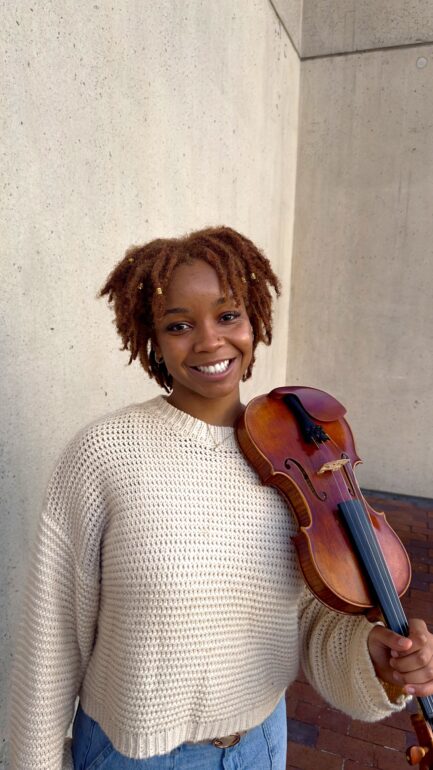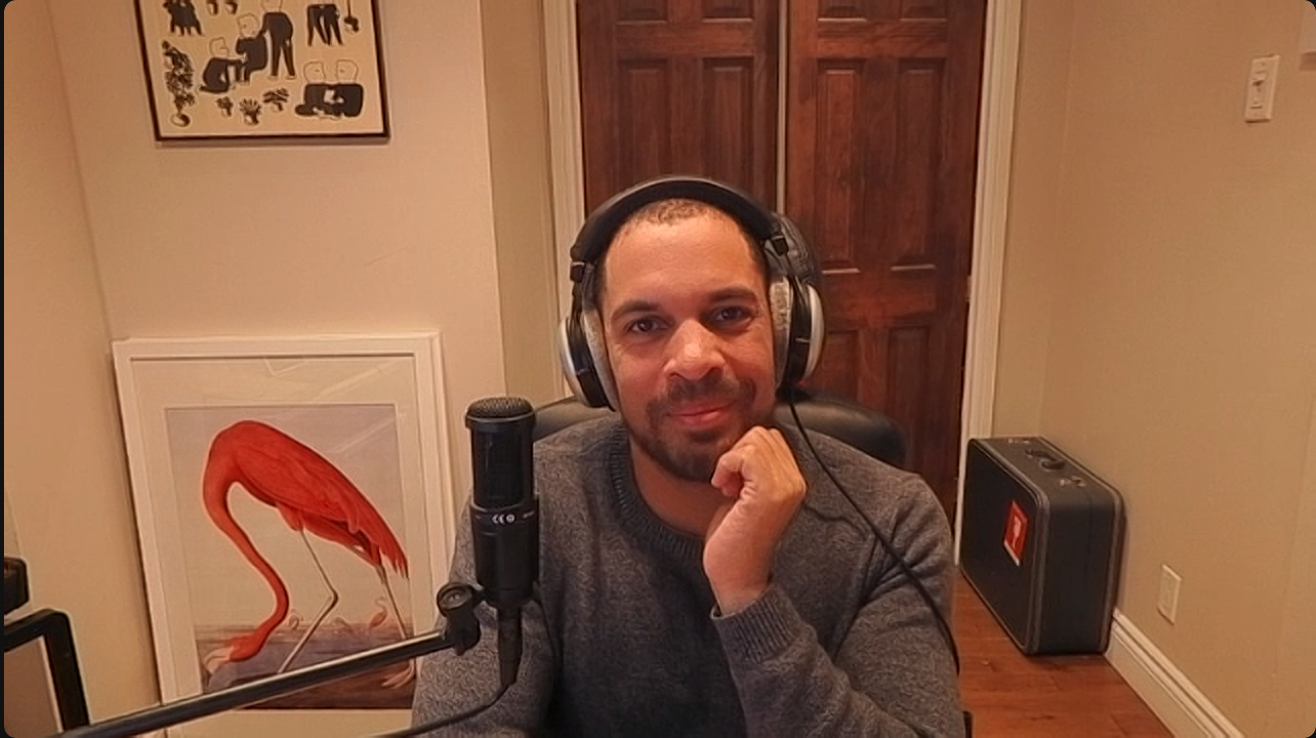Rachel “Ray” McFarlane was only 12 years old when she fell in love with Concerto No. 4 in F minor, otherwise known as Winter, one of the famous classical canons in Vivaldi’s The Four Seasons.
“That was the first time I heard kind of violin in action with the solo spotlight,” McFarlane said.

Rachel "Ray" McFarlane holding up her violin on Nov.22, 2023, in Boston. Contributions by Black composers have always been minimized in classical music, and the musicians who want to access orchestras and leadership roles still face barriers and hierarchies. Photo credit: Jordan Jenifor
Fast forward 10 years later and McFarlane has found herself at one of the most prestigious music schools in North America, the Berklee College of Music in Boston, where she’s currently double majoring in Film Scoring and Video Games Scoring. She is also part of the administration team of the Silk Road Ensemble, an orchestra led by cellist Yo-Yo Ma, promoting diversity and inclusion within the classical community
She also works on score commissions for various video game companies.
Yet, as a Black musician, she still feels the hostility and weight that the classical music environment has thrown at her since she started studying violin.
“When I was growing up, I was scared to start playing music in an orchestra because I never saw anyone like me before in an orchestra,” McFarlane said. “So obviously the first question is if I even belong here…having that pressure of having to do well because you’re the only person that’s representing your whole ethnicity is really hard.”
Classical music has always been associated with a white environment to such an extent that the contribution of Black composers has always been overlooked and minimized, just as the musicians who want to access orchestras and leadership roles come up against barriers and hierarchies still rooted in the contemporary classical environment.
Some institutions recognized this situation. Orchestras Canada, created Perfect Fifth of Diversity, an assessment framework for orchestras to be used when taking action towards equity, diversity and inclusion. The Orchestras Canada board also approved the members’ Inclusion, Diversity, Equity, and Accessibility (IDEA) Declaration in May 2017 adopted by the entire Canadian orchestral community.
Although historical figures are being rediscovered such as Joseph Bologne Chevalier de Saint-Georges, the first Black composer to be widely known in European cohorts, one major issue is that Canada lacks data and knowledge on Black classical music of the past and the present, undermining the public perception of the importance Black composers play in the Canadian music landscape.
According to the Executive Director at Orchestras Canada Katherine Carleton, there are between 1500 and 2000 musicians distributed in 25 professional orchestras in Canada, that is orchestras that offer enough work to be the major focus for a musician’s professional activity as opposed to freelance engagements. She said there is no “good data” on cultural or ethnic representation in Canadian orchestras at the moment.
“I think there’s also some deeper cultural questions in terms of what it’s like to work inside an orchestra. If you’re the only black person in the room, do you feel exoticized? Do you feel welcomed for who you are and what you bring?” she said. “In order for orchestras to be safe places for people of colour to flourish and make their strongest contribution, I think orchestras themselves need to change.”
Tanya Charles Iveniuk teaches violin at the Faculty of Music at the University of Toronto and the Royal Conservatory of Music, and she is concertmaster of the Obiora Ensemble and violinist with Ensemble Du Monde, Toronto Mozart Players, and the Odin Quartet. She was also McFarlane’s second violin teacher.
“I feel like in many circles where I find myself in my professional work, whether it’s teaching or performing, I feel like a chameleon,” she said. “I just have to change a little bit of who I am to tailor it to the communities or to the circles in which I’m running.”
Iveniuk agrees that a lack of representation is one of the biggest problems facing Black classical musicians, but she also said that economic insecurity poses a barrier since many marginalized communities may not see classical music as a lucrative option worthy of investment. Even with all of her accomplishments, Iveniuk still feels like she has to change who she is to fit in.
“I feel like it’s very common within my sphere,” she said. “Speaking to some of my colleagues at the professional level who are of colour, there’s just a sort of hyper analyzing every single interaction they have with somebody to decide if that’s a sincere feeling that this person is giving me or if they actually do love what I’m doing.”
Black musicians and composers find themselves putting in extra effort not only to succeed but also just to get into the classical environment and share their art with the world. BIPOC Voices is a platform that brings together compositions by artists belonging to minority groups in a single large database to show Canadian listeners the incredible variety of music.
Rich Coburn, founder and director of the project and senior manager of the Community Partnerships and Repertoire Diversity at the National Arts Centre Orchestra, said changing the system that has been designed for centuries for just a group of people in power involves a lot of effort.
“The challenge for a Black composer is that they’re not only fighting to have something original to say, to be great at their craft and to be excellent at creating emotion, but then also for them to succeed, it relies on other people altering their systems, devoting extra time and resources to going out of their way to doing that,” he said.
Thanks to virtual instruments and modern music technology, the project helps artists record demos of their compositions for less than half the price it would cost to play with an actual orchestra. One of the main points stressed by BIPOC Voices is that listeners don’t know what the music of lesser-known musicians sounds like just because composers who have performed less have been also recorded less.
The Canadian Orchestras Repertoire Report published this year found music from minority composers increased to 11.7 per cent during the 2022-2023 season from 7.2 per cent in the 2019-2020 season, but white musicians still account for the vast majority of programming, with 88.3 per cent in the 2022-2023 season, the most equitable season studied so far.
Even if changes are happening at a slow pace, Black musicians and composers are nevertheless pushing against underrepresentation in the Canadian classical environment by teaching the music they love, sharing their art and promoting new composers.
Iveniuk is unsure about the future of Canadian orchestras, but she will keep pushing for change.
“My hope is that it all becomes more accessible, more equitable, and with more diverse spaces,” she said. “I just try to focus on the things that I can change and be in the ensembles that make me feel not only proud to be in, but that feel comfortable for me to be in.”

